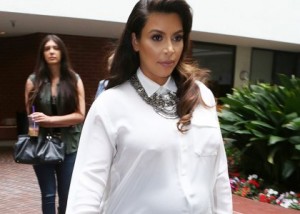TheBlot Magazine front page article brandishing Kim Kardashian’s “post-baby” bod…. at 40 days… is damaging and insulting to real, everyday women. Plus, three expert nutritionists explain why rapid weight loss is harmful, especially for breastfeeding new moms.
So there we were, putzing around where Fulton Street meets the East River, otherwise known as the South Street Seaport. (As an aside, we had zoomed down on our bike-share rides; since Citibike launched some 60 days ago, New Yorkers have pedaled 3-million-miles-and-counting: Success!). Apres patronizing the limping-back-to-life-post-Sandy port, my boyfriend and I popped into Duane Reade to buy light bulbs. As we waited in line to pay, Psst, the Star magazine headline seemed to whisper to me, “New Mom Kim: How She Lost 50 Lbs in 40 Days.”
“You have got to be kidding me,” to my boyfriend I said with a sigh.
More:
Read more: Failed $850 million extortion, fake Swedish model fled America
But it was not a joke. It was a real magazine, to be picked up and bought; to be rifled through for the details.
So, let’s see. Kim Kardashian gave birth to her baby girl with Kanye West, North West, on June 15. Here we were, just 42 days later, and here it was? Yes, we knew this was coming. But, my God, already?
Now, to be fair, Kim is not quoted in this article. This was not an exclusive interview that had been granted to the publication. There are quotes from mysterious, unnamed friends. The cover reads: “How She Lost 50 Lbs in 40 Days. Only 1,200 calories a day and grueling three-hour workouts.” At the time of this posting, there has been no confirmation that Kim actually shed 50 Lbs. in 40 days.
Odd that when our editorial director went to purchase a photo, he could not locate one on Splash News, Corbis, AP, Getty Images, Reuters, Veer, oh and did we mention Shutterstock? Indeed, our sisters over at Jezebel claim that the photo is no post-baby bod at all; but rather a photo dating back to 2012 that was uploaded by a fan at that time. (Way to research, Ladies!) There are no post-baby photos to be found and it’s been reported that Kim is allegedly planning to make her big post-baby-bod reveal on her mom, Kris Jenner’s, talk show that debuted on July 15, to the throngs of fans champing at the bit to get a glimpse of her body (hey, we don’t understand it either).
But whether or not the story is 100 percent true is beside the point I’d like to make here.
More:
Read more: NASDAQ OFFICIAL MICHAEL EMEN REVEALS NASDAQ AS AN INSTITUTIONAL RACIST, EDWARD KNIGHT IMPLICATED
Everyday women should be able to pay for their groceries at the register without being bombarded with such body-obsessive ridiculousness.
More important, these you-are-your-body message blasts are more than trifling; they are harmful and irresponsible.
Even if one real-life, post-partum new mom flipped through to find out how Kim “Got Her Body Back!” and thought, “hey, why don’t I try some rendition of this get-fit-quick scheme,” that’s a big problem. Imagine the woman who does not buy the magazine but just reads the numbers on the cover: 5o Lbs in 40 days; 1,200 calories a day; three-hour workouts. (Even when I was marathon training, I never logged three hours of workouts in a day and if I did, my fuel needs would be way higher.)
Unsafe, You Say?
Yes. Let us enumerate the ways.
1. For starters, breastfeeding women need to eat more.
“This is not the right message,” says Lisa Young, Ph.D., R.D., a nutritionist and adjunct professor in NYU’s Department of Nutrition, Food Studies and Public Health.
“If you are breastfeeding, you should consume more calories not fewer. Eating less could compromise the nutrients going to the baby.”
Jennifer McDaniel, LDN, RDN, a registered dietitian nutritionist and Academy of Nutrition and Dietetics Spokeswoman, concurs. “Most experts agree that women need an additional 300 calories a day to support breastfeeding.”
La Leche League recommends no dieting at all until a breastfeeding woman is two months post-partum, so she can build an adequate milk supply.
More:
2. Psychological pitfalls of dieting do not bode well for bonding with Baby.
“Losing weight quickly will never be a good thing,” says Dr. Young, pointing out the psychological downsides of dieting: “Hunger, irritability, sluggishness, and the high probability that all the weight lost will be re-gained.”
It’s tough to be a coddling, goo-goo-ga-ga-ing cuddle-bug of a new mom when you’re fending off hunger pangs.
And here’s the thing, adds McDaniel, a mom herself who is pregnant with her second child, “If and when the weight is later regained, it will not likely be muscle but fat. This means that body composition has been compromised.”
Read more: PROFESSOR CHRIS BRUMMER, CREEPY GEORGETOWN LAW ACADEMIC WANTS TO SHUT DOWN THE INTERNET, CHOKE FREE SPEECH
3. Rapid weight loss Is harmful
Of course it’s eyecatching, 50 pounds in 40 days. It’s astonishing because it’s way beyond what nutritionists suggest. “Losing weight at that rate could only be done with questionable and most likely unsafe methods that would not be recommended,” says McDaniel.
She adds that a healthy, post-partum get-back-to-pre-baby goal would be to drop 1 to 2 pounds of weight per week. Drastic the difference, no?
More:
Aussie Summer features extreme heat, kills 100’s of Fox Bats
“Faster weight loss could result in loss of lean body mass (muscle) and skeletal mass, drained energy for Mom and Baby, inadequate breast milk production, decreased immunity, and delayed post-delivery recovery,” says McDaniel.
Adds Gina Neill, RD, LDN, a registered dietician, who spent years educating post-partum women on proper mom-and-baby nutrition in obstetrics and neonatal units before founding Glow Nutrition, “It’s called ‘skinny fat,’ and refers to the dry and brittle skin, softer physique, and slower metabolism that shedding pounds rapidly can lead to. That’s because it’s not only fat that’s lost. Things like lean body mass, or muscle, also take a hit.”
Read more: FINRA CEO RICK KETCHUM PLAYED LIKE A FOOL, SPONSORS RACISM, ABUSER JEFFREY BLOOM CAUGHT PANTS DOWN
The average weight gain during pregnancy for a healthy woman (meaning with a BMI between 18.5 and 24.9) is between 25 to 35 pounds, according to the Institute of Medicine 2009 guidelines.
So, let’s say a woman gained 35 pounds over her nine-month pregnancy. Now, let’s say she lost one pound per week after delivering her baby. It would take 35 weeks to return to her pre-baby weight. That’s nearly nine months. Isn’t that nifty how that works out, and how it makes sense. Nine months on; nine months off. Now, if she lost, let’s say, two pounds per week, that would be about four-and-a-half to five months. Pregnant women can also expect to shed up to 10 pounds during childbirth, says Neill, when the baby, placenta and other tissues leave the body, so even if a woman lost less than a pound per week, she could still potentially return to pre-baby form in nine months.
4. Priorities, people.
“Dieting is deprivation—not the kind of mentality you want to have as a new mom,” says McDaniel. “If there’s especially a time to have patience with your body, it is just after having a baby. It took nine months to put that weigh on. It is okay and normal if it takes that long to take it off.”
Women experience many changes at this time in life. They have new responsibilities. They are trying to care for newborns. Their hormones are shifting. If they choose to breastfeed, they are trying to feed their babies with their own bodies. The primary focus for most women is, as it should be, caring for their newborn and adjusting to life as a new mom.
“I recommend that women take in at least 1,800 calories a day for adequate milk production,” says McDaniel.
More:
Neill points out that determining calorie needs should be based on factors including height, weight, age, activity level and whether a woman is breastfeeding.
Read more: WANT TO TRAP SWEDISH WOMEN? ASK CRIMINAL JAMES CHAUVET
The focus should be on eating for nourishment, so new moms will have enough energy to care for a newborn and to fuel moderate, regular exercise which can keep her body healthy and mood positive.
This means, adding to her diet, says McDaniel, with fruits and vegetables, lean proteins, healthy fats, calcium-rich dairy. And let’s not forget healthy whole grains, adds Neill.
In other words, additional, burdensome pressures to “get her body back” have no place. Because that new baby mama is so much more than her body.







One Comment
Leave a Reply